Langa Township
Sunday April 12, 2015 (Africa, South Africa)
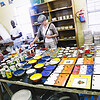
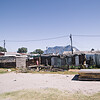
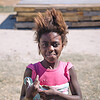
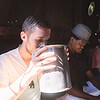
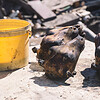
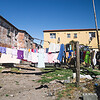
Before we get started, I wanted to mention something from yesterday. We went out for a meal on a recommendation for “a good burger” to a place called “The Dog’s Bollocks”. What a cool place — it’s not really a building in itself but exists in an alleyway between two other places. Both outdoor and indoor seating. The way it worked was that you’d write your name and how many people were in your group on a door in chalk. Then at some point the girls working the grills (who called themselves “The Bitches”) would scream your party’s name and you would order your burgers. Cue a wait for a few minutes and your name would be yelled again to come pick up your food. Simple! Needless to say (since I’m writing about it today) the burgers were fantastic. I loved my jalapeno and cheese beef burger. Spicy, and just messy enough to feel like a real burger. I actually felt great once I’d eaten it too (although it was the size of my head). Not sure how such a large burger can taste so light! Anyway, enough about that. Go there to eat.
Now for today.
We took our car over to Langa township where we were meeting a guy named Nadi to take us on a walking tour. Langa township, established 1923, is one of the oldest townships in South Africa and the oldest in the Cape Town area. In comparison to other townships like Khayelitsha it’s very small in population, with about 50,000 people as compared to Khayelitsha’s 450,000 or so.
The townships themselves were established initially as areas for the black population to live. South Africa’s history is chock full of segregation issues, and this is certainly one of its legacies.
Our first stop on the tour was to a local pottery area within the community centre where they showed us some of their work. The idea behind the project was to have local artisans training both adults and school children how to make various pottery pieces with the goal of giving them marketable skills. In addition to the pottery project, there were music projects, photography projects and so on.
Next we began walking around the township and past an area with a whole bunch of shacks side-by-each. Our guide told us that often people living in the shacks had other residences within the township. But because entire families live together from grandparents all the way down to infants, some members of the family may desire some degree of privacy. As a result, they would strike off and build themselves a shack as a refuge to seek privacy when necessary. Teenagers bringing their new crush home, for instance.
Another interesting fact is that many people in the township have more than enough money to afford homes in more “desirable” areas of the city. But there is a pride and community in the townships that causes people to stay — what point would there be in moving and leaving behind all of your friends and family? From the outside, one might easily imagine living in the townships as a means to an end, but for many people it’s the only home they want.
We visited a “shebeen”, which is an “informal business” (aka an unlicensed bar) run within the township. The word comes from the Irish word síbín meaning “illicit whiskey". Many business start in this informal manner until the business does well enough to be registered and pay taxes. At the shebeen we were invited to drink some local sorghum beer. It’s only about 1-2% alcohol, but it’s a traditional drink that’s imbibed at many ceremonies. Drinking starts with the eldest (looking at you, Dave), and continues around in a clockwise fashion. The drink itself tasted almost sour, but it was nice!
Another informal business that really exploded was the selling of sheep heads. Traditionally only the elders were given the sheep’s head at a meal. With this in mind, entrepreneurs decided that they could just sell sheep heads directly to the people, thus allowing the younger generation to taste the same stuff that all of these old people were fussing over. It’s succeeded enough that sheep heads are now imported from New Zealand (where they’re not used) to be sold here!
We also stopped by a “hostel”, which is really just a shared living facility that’s quite common in the townships. Quite a number of people will pack into a room and pay a minimal rent (the equivalent of about 2 CAD a month) to the government. Shared cleaning and cooking duties and so on. But it allows many people to save money to potentially buy or build their own home in the township someday.
All in all it was an incredibly informative tour. Certainly the gap between the rich and the poor is on display in the townships, but we received lovely welcomes and many warm smiles from the residents. Although to some people townships have a reputation for being dangerous, it was plain to see how proud the locals were to live in Langa, and with good reason!
Finally, your South African slang lesson for the day: the word “lekker” meaning “nice” or “good”. It comes from the Afrikaans language.
Ooh, and another good one is the fact that they call traffic lights “robots” here. Makes everything feel like the future, so I like it. Robots everywhere!
Ooh ooh, and one last one. They call “honking” as in honking your horn “hooting”. Like an owl. So there are fun signs discouraging people from making noise that say “NO HOOTING!”. Duly noted.